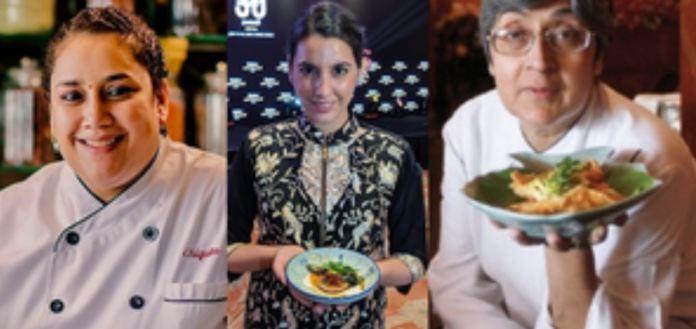New Delhi–There was a time when a woman in a five-star hotel’s kitchen was such an oddity, as a senior chef remembered some years ago, that she and a couple of new female inductees decided to do exactly what the men did: use foul language and light up a cigarette during breaks.
Seeing women just like them, that too women who used English profanities, the male chefs grudgingly accepted them, but also gave them some friendly advice: If they wanted to get married and have children, like all good women should do, they should quickly seek a transfer to the patisserie, which was air-conditioned and the duty hours were regular.
You could imagine their utter shock when these ‘achche ghar ki ladkiyan’ told them bluntly that they had come to become chefs and the hot kitchen was their way forward.
Unlike the case in people’s homes, kitchens in five-star hotels and restaurants were a man’s world where generous dollops of suspicion and contempt used to be heaped upon women who ‘trespassed’ into them.
That was the world that Veena Arora walked into in 1994, after having grown up in Bangkok and trained in London, when she joined the Thai restaurant named Silk Orchid at the then Holiday Inn (now known as The Lalit in New Delhi). Arora left The Imperial, where she presided over the iconic Spice Route restaurant, last year to turn a chef-entrepreneur, satisfied that pioneers like her have made a difference to their industry’s old mindset.
Less than two decade after Arora’s entry into Silk Orchid, author and Parsi cuisine exponent Anahita Dhondy can happily remembers how as an industrial trainee from IHM Aurangabad, she was pushed into the banquet kitchen of New Delhi’s Taj Mahal Hotel by the executive sous chef, who wanted them rise and shine by burning their hands and scalding their skin.
The gender barrier was finally coming down, but old attitudes continued to persist, as chef and restaurateur Chiquita Gulati, discovered much after she was running her own show.
A relative of hers (she grew up in a well-to-do Gujarati family in Mumbai and studied at the prestigious hospitality school at Les Roches, Switzerland) met her in a chef’s uniform and (obviously, she had been conditioned by cookery shows!) exclaimed: “Kya baat hai, aaj toh tum chef bane hue ho! (My, my, you are dressed up like a chef today!)” To quote Gulati: “It was a subtle reminder of the gender stereotypes that continue to linger even in my own circles.”
Of course, the transition has been physically demanding. As Dhondy says, remembering her days at the Taj banquet kitchen, “Honestly I hated it at first. It is loud and hot, it is noisy and hectic, quite the opposite of the air-conditioned pastry room where ambient music is played just to keep you in the right frame of mind.”
Talking about her decision to stay put in the hot kitchen (she earned her spurs with the Irani-Parsi restaurant chain, Soda Bottle Opener Wala), she mentions her Le Cordon Bleu batch. “Most of the Indians in my batch in London became pastry chefs, except three: Vanshika Bhatia, Urvika Kanoi and I. And I am so glad we did that because we are all successfully running our own businesses.”
Fortunately for women chefs, as Arora points out, families too have changed the way they view the profession.
“Over time, as women proved their strength and dedication, perceptions shifted,” Arora said. “Educated women emerged stronger, more independent and confident, breaking free from traditional constraints. Families now recognise the positive impact of women working in the industry, supporting their roles as providers and caretakers.”
Life, indeed, has changed for women in the profession. “From being the underdogs who had to work extra hard to getting noticed, getting the big-ticket opportunities, to the present, it’s been a journey full of ups and downs,” Gulati said.
Despite being married into the family that owns the established and popular Gulati restaurant at Pandara Road in New Delhi, Gulati launched the Spice Route, a pan-Indian eatery in Saket, and then, during the Covid lockdown, the Call Chotu food delivery service.
With 30 years to look back upon — 30 years that have seen trail-blazing chefs such as Nita Nagaraj, Madhu Krishnan, Manisha Bhasin and Ritu Dalmia — Arora sees the change in the right perspective.
She said: “The evolution is evident in today’s kitchens, where women are not only accepted but celebrated. Specialised kitchens with an all-female staff highlight the capability of women to successfully run restaurants and manage kitchens independently. It reflects the resilience, strength and competence of women in large-scale industrial kitchens, and their success in challenging and redefining traditional gender roles.”
Women no longer have to swear to earn their respect in the hot kitchen. (IANS)














